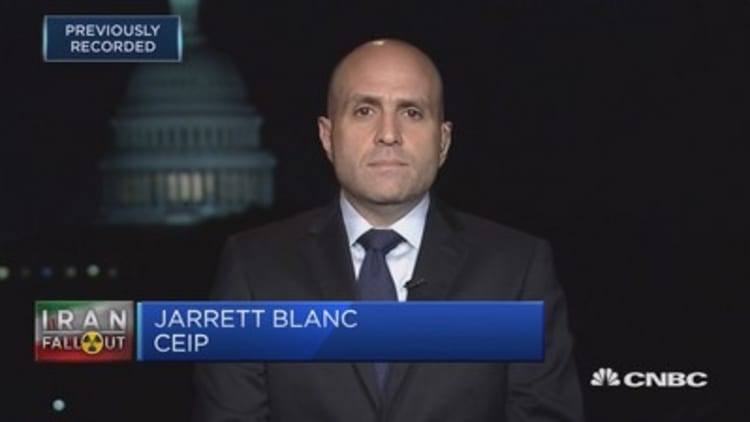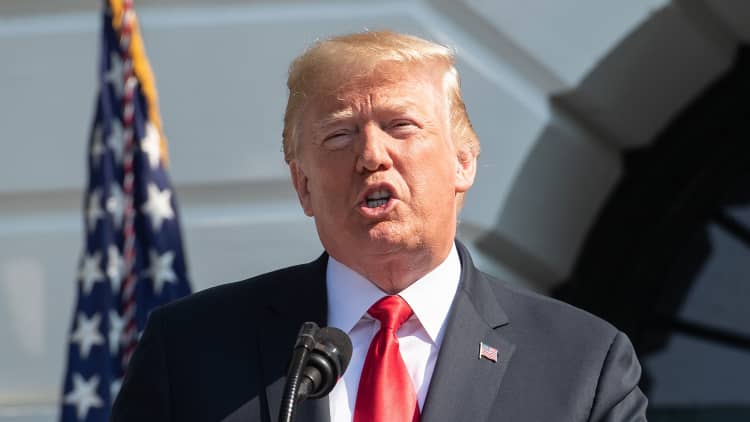Protests are spreading in several Iranian cities, fueled by the re-imposition Monday of U.S. sanctions on the Islamic Republic against a backdrop of already spiraling economic conditions.
But while some in the Donald Trump administration have alluded to regime change as an aim of the punitive sanctions, the domestic fallout is unlikely to shake the government's hold on power, Iran experts say.
Hundreds are rallying to demonstrate against hyperinflation, caused by the anticipated reinstatement of restrictions and economic mismanagement on the part of the regime. Demonstrators in some towns have attempted to set fire to buildings, with scores detained over the weekend and at least one person killed.
The Iranian rial hit a record low of more than 119,000 to the dollar this month, and has lost 80 percent of its value in the past year. The prices of basic goods — if they can be found — go up by the hour, and people are stockpiling.
All this began before the sanctions went into effect. Now, as the first volley of U.S. sanctions makes landfall, Iran is seeing its auto and airline sectors sanctioned and will no longer be able to purchase U.S. dollars or trade in gold and other precious metals.
Regime change nudges
The Trump administration has long expressed its disdain for Iran's government, chastising its destabilizing regional activities, documented support for terrorist groups and ballistic missile testing as reasons for its withdrawal from the 2015 Iranian nuclear deal, which lifted economic sanctions on Iran in exchange for curbs on its nuclear program.
Recent speeches and comments by administration officials underline the hawkish bent among many in the White House. National security advisor John Bolton openly supports groups like the Mujahedin e-Khalq, a militant group advocating violent regime change in Iran, and Secretary of State Mike Pompeo recently called Tehran's authorities a "kleptocracy," expressing support for the "aspirations of the Iranian people."

As the protests look set to grow, it might appear some of the administration's aims are being met. Several demonstrations have taken an increasingly political tone, with anti-regime slogans gaining frequency since January, reflecting already deep popular discontent. Anger toward the government among many in Iran far pre-dates the Trump administration.
But this is unlikely to threaten the regime, due mainly to its overwhelming repressive capacity.
"[Iran's] security forces are brutal, efficient and loyal," Henry Rome, Iran researcher at political risk firm Eurasia Group, said in a client note Tuesday. "U.S. efforts to foment domestic dissent will probably backfire, given Iranians' historic rejection of outside interference."
Protests will increase — but so will repression
"The Iranian government is highly adept at putting down protests," said Behnam Ben Taleblu, a senior fellow at the Foundation for Defense of Democracies (FDD) in Washington D.C. Iran's Islamic Revolutionary Guard Corps (IRGC) and its paramilitary force, Basij, numbers around 250,000 and law enforcement personnel constitute an additional half million across the country, bolstering coercive power.
These bodies were instrumental in putting down Iran's 2009 Green Movement, a student-led political revolt that saw scores killed by government forces.
But demonstrations are likely to continue as conditions deteriorate, said Ehsan Khoman, director of Middle East and North Africa Research and Strategy at MUFG Bank.
"We anticipate that growing economic disorder in Iran will lead to an increase in the frequency of protests in the near term," he told CNBC in an email, adding that beyond sanctions, Iran's economy is further handicapped by its own authorities, who have allowed gaping infrastructure deficiencies, a weak banking sector and widespread corruption.
Still, he said, "The protests are likely to wind down and will not result in a revolutionary tipping point. When it comes to regime survival, Supreme Leader Khamenei is in control, and at his disposal are an ample set of loyal individuals and groups… [making] the current set of noise regarding regime change as premature."
Iran under sanctions: Been there, done that
Jarrett Blanc, a senior fellow at the Carnegie Endowment for International Peace and former State Department coordinator for Iran nuclear implementation, agrees.
"There are clearly people in the administration who are serious hawks, they like to increase the pressure on Iran and aim for some sort of regime change. I think that's a naive and unrealistic expectation for sanctions pressure," he told CNBC's "Street Signs Europe" on Monday.
Blanc pointed to the fact that harsher sanctions imposed on Tehran by the Obama administration between 2012 and 2014, implemented with broader international support, still failed to shake the Iranian government's hold on power.

Additionally, protests in Iran are not all that uncommon — frustrations over economic concerns, water quality or boundary issues are not necessarily rejections of the government itself. And censorship in the Islamic Republic makes it hard to verify the actual size of demonstrations.
Still, despite the government recently tweaking foreign exchange policy in efforts to bolster the rial, the psychological effect of the sanctions will keep anger running high. Should Tehran not be able to pay its government forces and the scale and scope of protests increases, Ben Taleblu said, "the regime would be in big trouble."
This month's sanctions are mild, however, in comparison to what is to come: sanctions on the country's lifeblood oil sector, set to be enacted November 4, by which time the U.S. is demanding all countries bring their Iranian crude imports down to zero. Despite indications that some major Iranian trading partners like China, India and Turkey will not be meeting this demand, the impact will constitute Washington's most painful blow yet and likely boost global oil prices.
According to forecasts by Eurasia Group, Iran's economy will likely contract this year by 5 to 8 percent, with annualized inflation potentially soaring to 50 percent.


